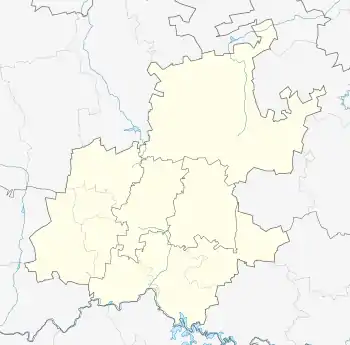Victory Park | |
|---|---|
 Victory Park Victory Park's location in Gauteng | |
| Coordinates: 26°12′06″S 28°02′27″E / 26.20167°S 28.04083°E / -26.20167; 28.04083 | |
| Country | South Africa |
| Province | Gauteng |
| City | Johannesburg |
| Area | |
| • Total | 1.50 km2 (0.6 sq mi) |
| Population (2011)[1] | |
| • Total | 2,402 |
| • Density | 1,601/km2 (4,146.6/sq mi) |
| Races | |
| • White | 56.5% |
| • Asian | 12.5% |
| • Cape Coloured | 1.0% |
| • Black | 28.9% |
| • Other | 1.2% |
| Languages | |
| • English | 68.3% |
| • Afrikaans | 7.5% |
| • Zulu | 5.9% |
| • Tswana | 5.0% |
| • Other | 13.4% |
Victory Park is a suburb of Johannesburg, South Africa, around 8 km northwest of City Hall.
Victory Park covers 1.6 km², including several smallholdings and a pair of blocks that include the private Jewish high school in the King David Schools network and the Victory Park Hebrew Congregation building. To the north is Delta Park in Blairgowrie, to the northeast is Craighall Park, to the east is Parkhurst, to the southeast is Greenside, to the southwest is Emmarentia, and to the west is Linden. In the old municipal borders, Victory Park was part of Johannesburg and separated by Linden from Randburg.
Victory Park was founded on Braamfontein Farm in January 1919. The name was in honor of the Allied victory in World War I.
Sources
- Raper, Peter Edmund (2004). New Dictionary of South African Place Names. Johannesburg/Cape Town: Jonathan Ball Publishers.
- Stals, Prof. Dr. E.L.P (ed.) (1978). Afrikaners in die Goudstad, vol. 1: 1886 - 1924. Cape Town/Pretoria: HAUM.
References
- 1 2 3 4 "Subplek Victory Park". Census 2011.
This article is issued from Wikipedia. The text is licensed under Creative Commons - Attribution - Sharealike. Additional terms may apply for the media files.